NBA Playoffs : The MVPs Duel
Se quiser ler este texto em pt-br, clique aqui.
Introduction
The NBA, the world’s premier basketball league, is split into two conferences: the Eastern and Western. Each season begins with a regular schedule, when every team faces one another, and concludes with the playoffs, in which teams compete only against opponents from their own conference, until the NBA Finals, in which the winner of each conference plays for the league’s championship.
This year’s Western Conference playoffs delivered one of the most thrilling seven-game series imaginable, as the top‐seeded Oklahoma City Thunder—fresh off a historic 68–14 regular season—took on the fourth‐seeded Denver Nuggets, who finished a strong 50–32. Despite their differing records, both clubs feature one of the sport’s brightest stars.
Oklahoma City’s Shai Gilgeous-Alexander and Denver’s Nikola Jokić, both leading MVP contenders, put up spectacular numbers. Shai led the league in scoring, averaging 32.7 points per game, while Nikola ranked among the top three in points, rebounds, assists, and steals, producing one of the greatest individual seasons in NBA history. After each advanced through the first round, they squared off in a historic playoff showdown
Game 1 (DEN 121 – 119 OKC)
Denver faced a steep disadvantage heading into Game 1: they’d had just one day to rest after a grueling seven-game series against the Clippers, while Oklahoma City enjoyed an eight-day layoff. Most observers expected Denver to be overmatched.
But Nikola Jokić—one of the season’s MVP frontrunners—put on a masterclass. He poured in 42 points on 51.7 percent shooting and hauled in 22 rebounds, spearheading a vital upset over the Thunder.
Oklahoma City still got big nights from their stars: Shai Gilgeous-Alexander scored 33 points, and reserve guard Alex Caruso chipped in 20 points and five steals, helping force Denver into 18 turnovers.
ESPN Analytics gave OKC a 98 percent chance to win with six minutes left in the fourth quarter (trailers down 95–108), but Denver stormed back. Jokić alone scored 18 of his points in that final period, rallying the Nuggets to a dramatic victory.
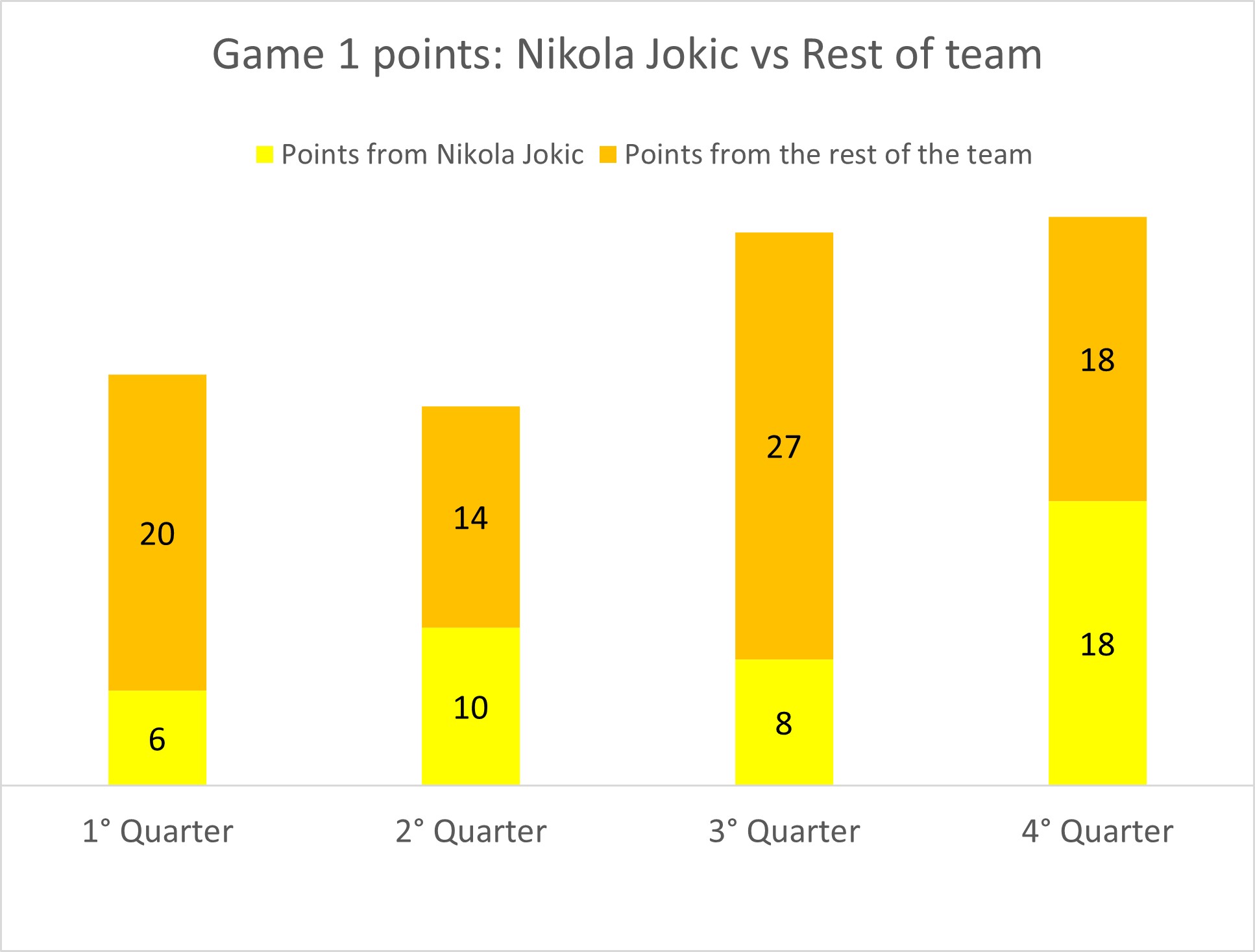
Game 2 (DEN 106 – 149 OKC)
In Game 2, the Thunder overwhelmed the Nuggets from the opening tip. Shai Gilgeous-Alexander was nothing short of sensational, pouring in 34 points by the end of the third quarter on an almost surreal 11-for-13 shooting (84.6%). He toyed with Denver’s defense, attacking off the dribble, pulling up from midrange, and finishing through contact at the rim.
Oklahoma City wasted no time stamping its authority. By the end of the first quarter, the home club had built a 24-point cushion, igniting the crowd and forcing Denver into its first lineup adjustments. The thunder kept rolling in the second period, and in the third, they outscored the Nuggets by an additional 17 points. With a 41-point lead as the fourth quarter began, victory was all but assured before the final buzzer.
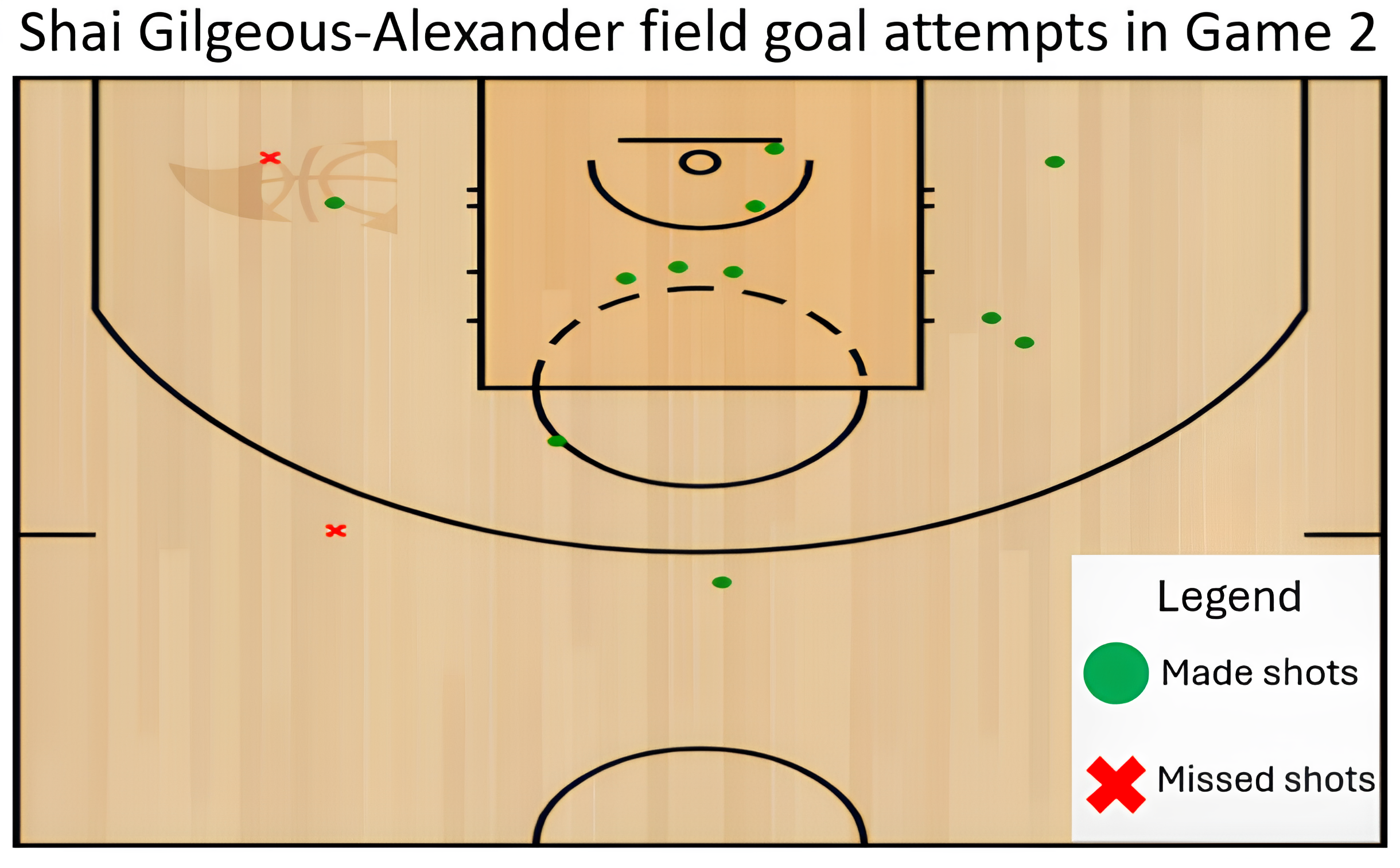
Game 3 (DEN 113 – 104 OKC)
In a nail-biter that stretched into overtime, the Denver Nuggets ultimately prevailed thanks to Jamal Murray’s all-around mastery. Murray poured in 27 points, dished out 8 assists and came up with 4 steals, asserting himself as the game’s defining force on both ends of the floor. His relentless pressure—both as a creator in the half-court and as a disruptor on defense—kept Denver’s momentum alive when it mattered most.
Oklahoma City’s young wing Jalen Williams likewise turned in a spectacular performance, tallying a career-high 32 points on a blend of smooth pull-ups and aggressive drives. Yet his heroics weren’t quite enough: Shai Gilgeous-Alexander, typically the Thunder’s engine, managed just 18 points on 7-for-22 shooting (31.8%), a rare off night compared to his torrid regular-season pace. And although Nikola Jokić logged heavy minutes, he never found his usual rhythm—finishing with 20 points but also losing the ball eight times, well below the MVP-level production fans have come to expect. Ultimately, Murray’s late-game poise in overtime tipped the scales in Denver’s favor.
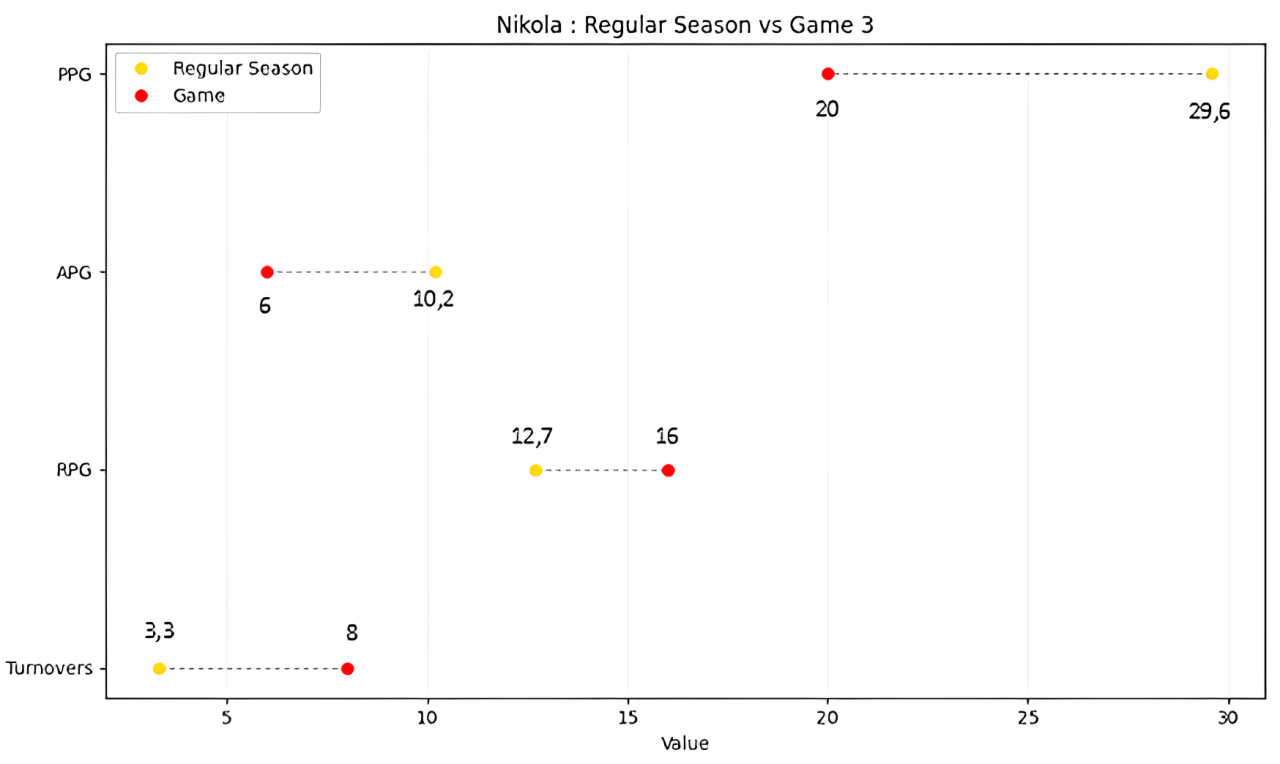
Game 4 (DEN 87 – 92 OKC)
Game 4 proved the roughest outing of the series. Both clubs looked out of sync, with Oklahoma City managing just a 35.6 percent field-goal rate and Denver an even lower 31.3 percent—their worst shooting marks all series.
That offensive slump stemmed largely from fatigue. The Nuggets arrived on virtually no rest after a grueling seven-game battle with the Clippers, while the Thunder’s long layoff couldn’t fully compensate for rusty legs. With little recovery time, neither team could find its usual rhythm.
Hall-of-Famer Charles Barkley called the scheduling “unfair” to Denver, noting it’s tough to play Friday night and then turn around for Sunday afternoon with almost no break.
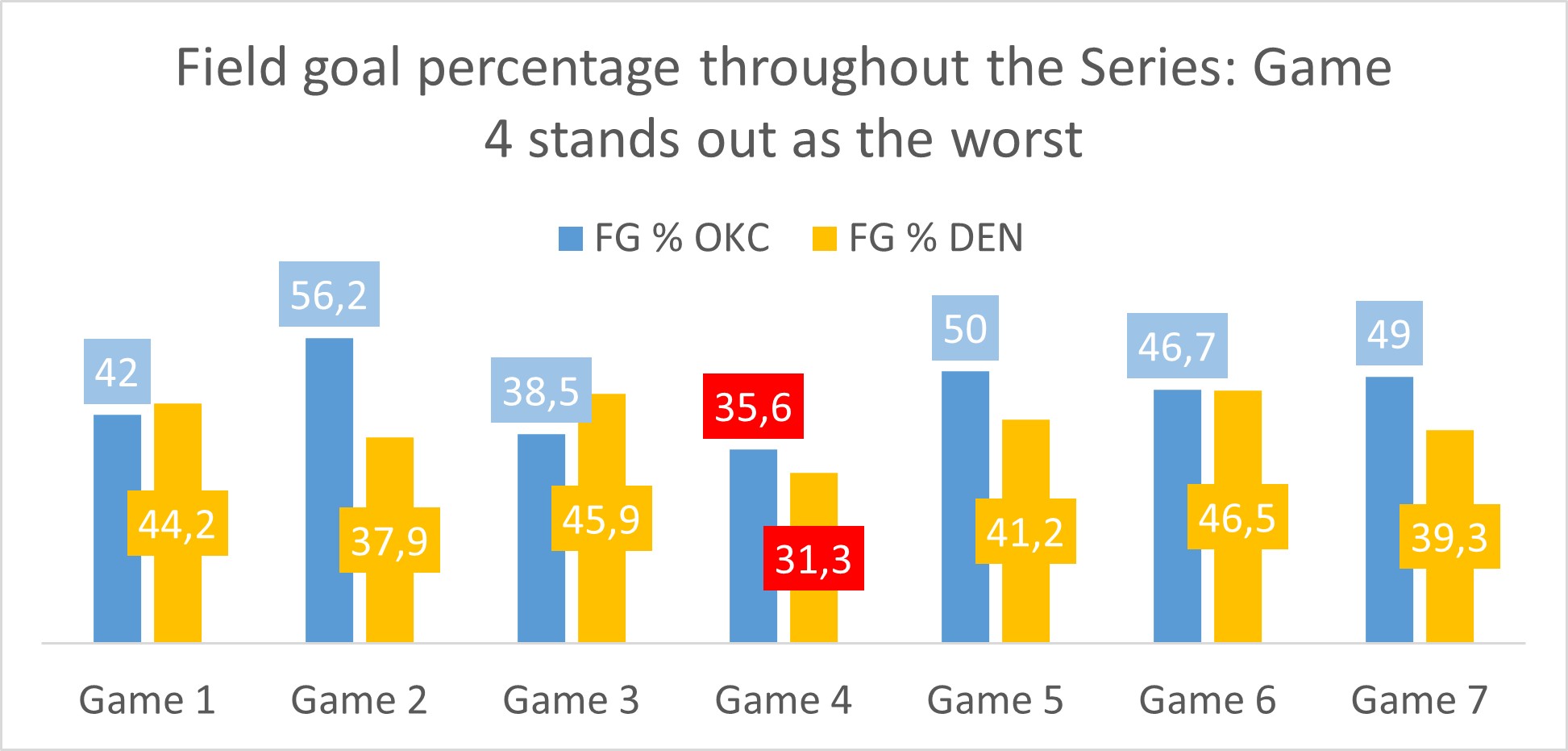
Game 5 (DEN 105 – 112 OKC)
Nikola Jokić delivered a masterclass—44 points on 68 percent shooting—but his teammates never caught fire. Michael Porter Jr., for example, logged 29 minutes yet scored just two points, connecting on only 14.3 percent of his shots.
By contrast, Oklahoma City boasted a balanced attack, converting 50 percent of its field goals and featuring six players in double figures. That collective efficiency carried the Thunder to victory and underscored their status as the game’s best team.
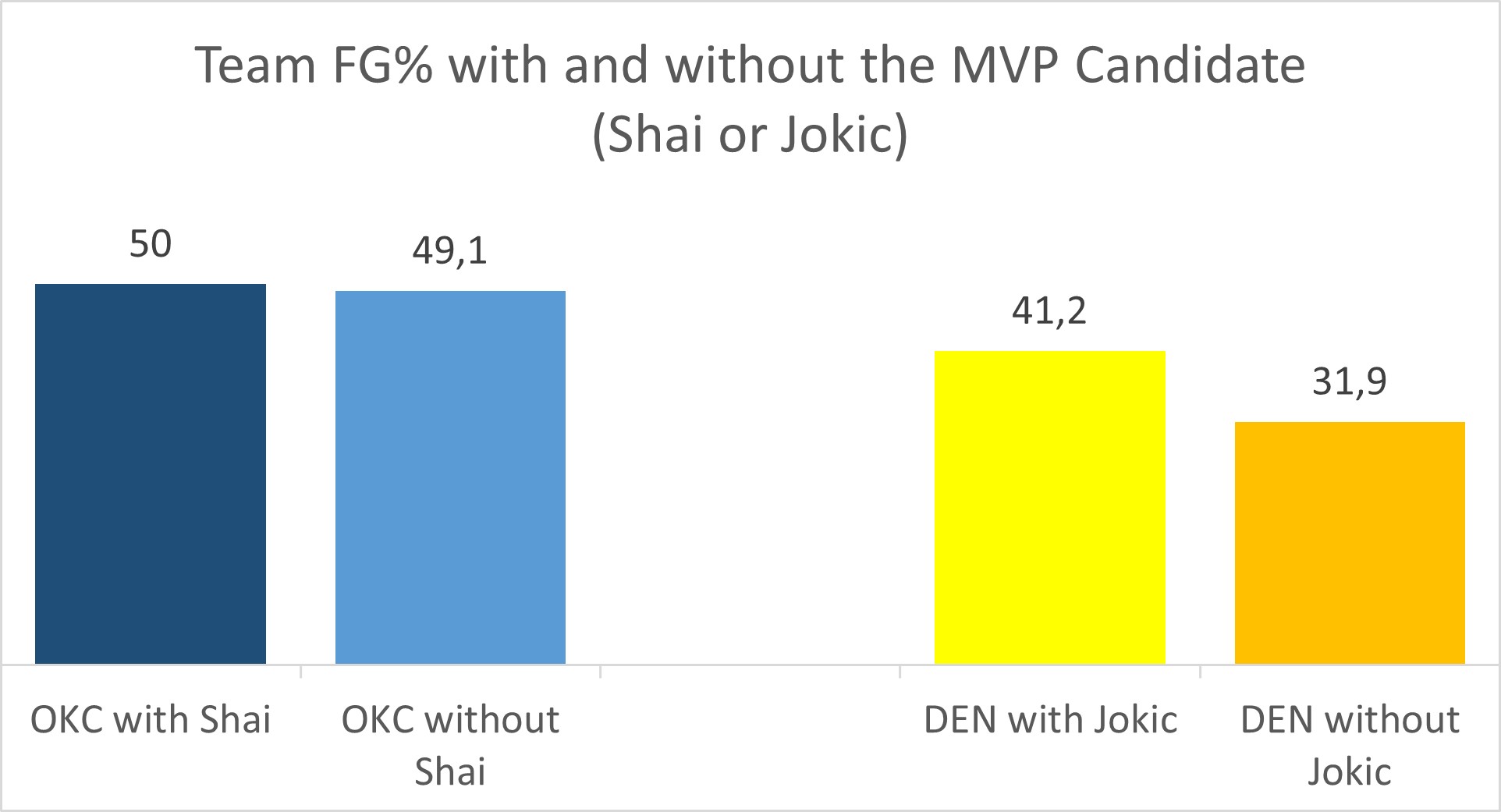
Game 6 (DEN 119 – 107 OKC)
Sick? You wouldn’t know it. Jamal Murray’s availability for Game 6 was in serious doubt after the flu laid him low—interim coach David Adelman even admitted he was “definitely sick”—and he wasn’t cleared to play until just 45 minutes before tip-off. Yet in this “flu game,” Murray still poured in 25 points, lifting Denver to victory and forcing a winner-takes-all Game 7.
And he wasn’t alone. Julian Strawther provided a key spark off the bench: in just three minutes of third-quarter action, he rattled off eight points that shifted the momentum. When Strawther checked in, the score was 80–78 in Denver’s favor; by the time he sat back down, the Nuggets had extended their lead to 90–81—an impact performance in the biggest moments.
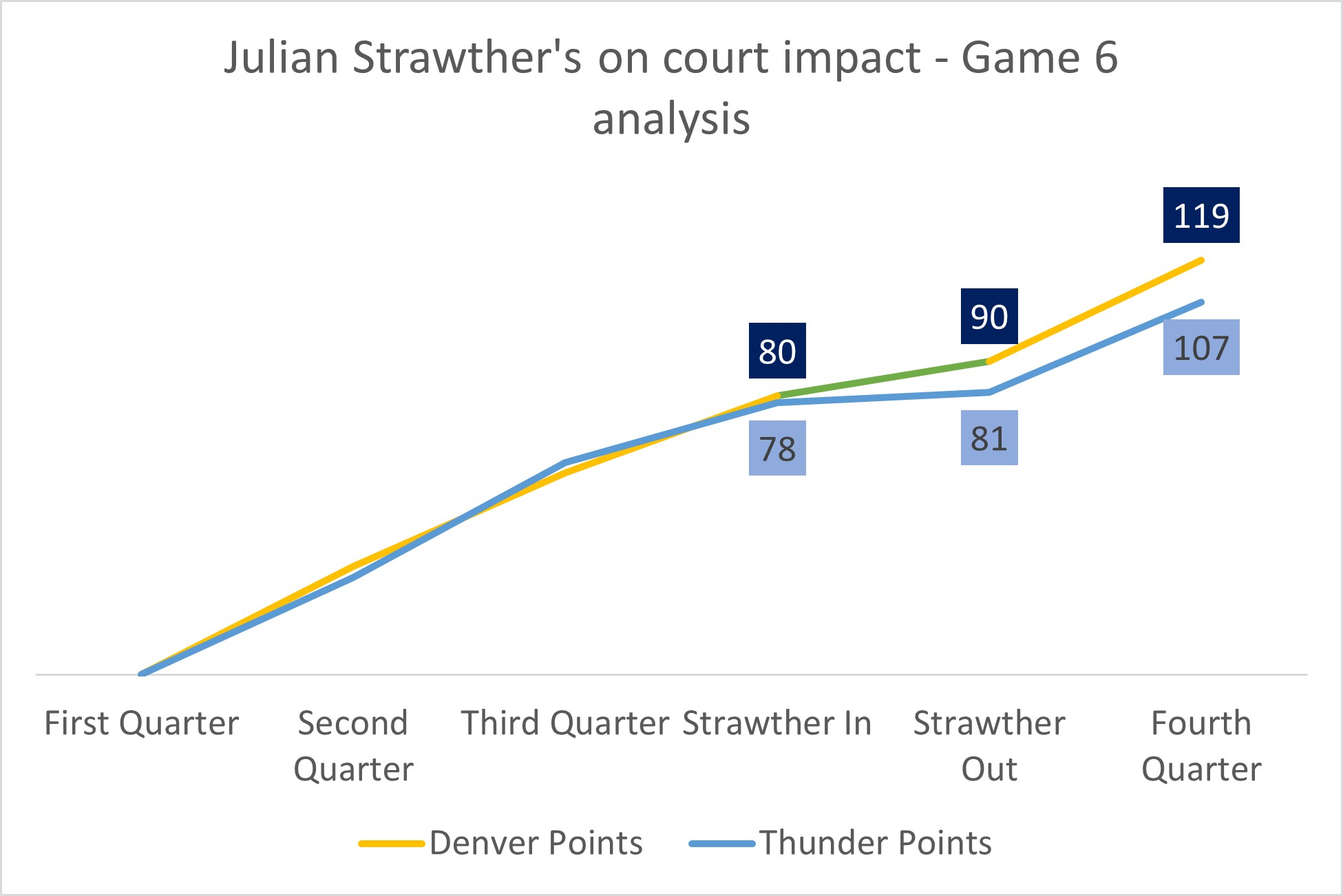
Game 7 (DEN 93 – 125 OKC)
In Game 7, OKC won the series and advanced to the Western Conference Finals. Despite holding a five-point lead after the first quarter, the Denver Nuggets couldn’t maintain the pace—especially in the second quarter, in which they committed eight turnovers compared with the Thunder’s two. OKC outscored Denver 39–20 in that period, and the lead only grew in the second half. In addition to the turnovers, the Nuggets shot under 23 percent from three-point range.
On Denver’s side, key role players Jamal Murray, Michael Porter Jr., and Aaron Gordon combined for just 27 points on 39 percent shooting. By contrast, OKC’s supporting duo, Jalen Williams and Chet Holmgren, combined for 37 points on 53 percent shooting.
Finally, MVP candidate Shai Gilgeous-Alexander delivered an outstanding performance, scoring 35 points on 12 of 19 shooting and knocking down 75 percent of his three-point attempts.
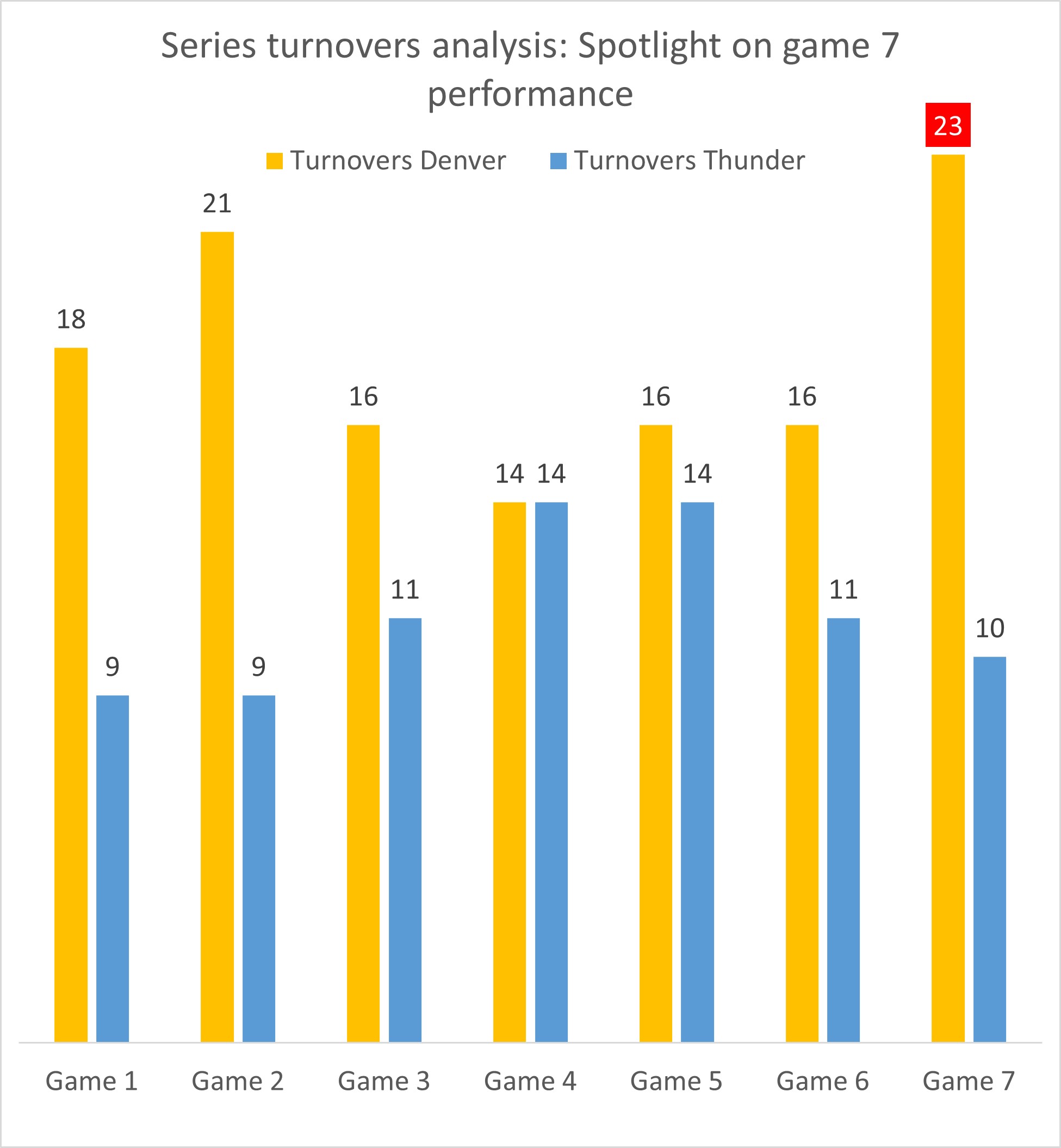
Conclusion
Though the Thunder finished the regular season with one of the greatest records in NBA history (68–14), they struggled mightily against the Denver Nuggets—Denver accounted for 29 percent of Oklahoma City’s defeats until the western conference finals, handing them five of their 17 total losses on the year (including two regular-season setbacks and three in the playoffs). The championship series itself became a war of attrition: MVP candidates on both sides raised their games, while the Thunder’s tenacious defense forced an astonishing 124 turnovers over seven hard-fought contests.
In the end, Shai Gilgeous-Alexander captured MVP honors, leading all scorers with a blistering 52.9 percent field-goal rate and averaging 29,7 points per game in the series to cement his reputation as a franchise cornerstone. Nikola Jokić was hardly far behind—he posted a series-long double-double, averaging 28.4 points and 13.9 rebounds per contest—underscoring just how razor-thin the margin was between these two superstars.
Enjoy Reading This Article?
Here are some more articles you might like to read next: